The Best Contract Management Software
Leveraging over 25 years of experience, we’ve crafted this guide to the top contract management software, focusing on custom workflows, e-signature capabilities, and document management.
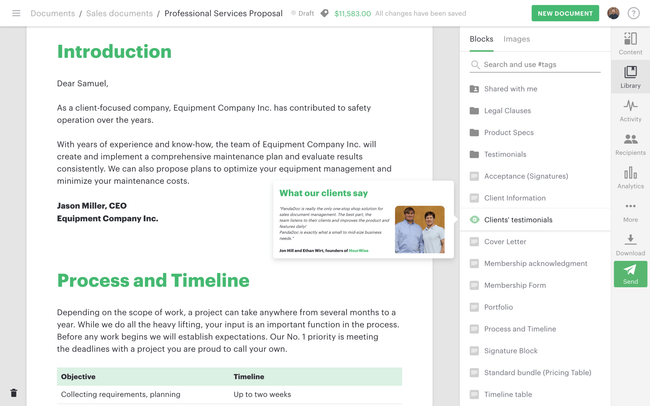
- Offers free version
- eSignature capabilities for proposals, quotes, contracts
- Includes template creation and document management
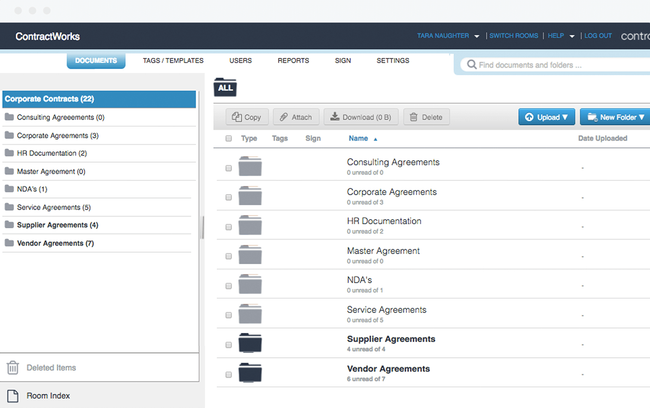
- Easy to upload, tag, e-sign documents
- Customizable reports
- Alerts for contract milestones
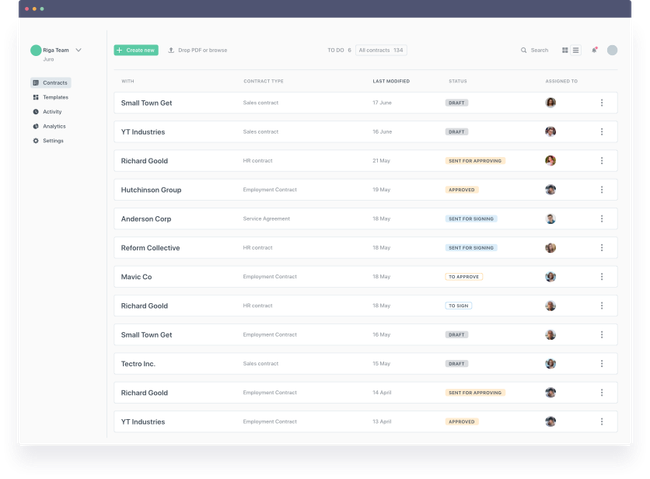
- AI-powered analytics
- Responsive customer support
- Streamlines legal functions
Contract management software is a digital tool designed to streamline the creation, execution, and analysis of contracts. We used our software review methodology to rank our top picks based on scalability, key features, and security measures.
- PandaDoc: Best Overall
- ContractWorks: Best for Small Businesses
- Juro: Best for Legal Teams
- Cobblestone Contract Insight: Best AI Tools
- Coupa: Best Procurement Tools
- Icertis: Best for Enterprises
1 PandaDoc - Best Overall
Why we chose it: PandaDoc is our top pick for contract management software due to its intuitive feature set and user-centric design. Overall, the software simplifies the contract lifecycle process, from document creation and editing to eSignature collection and contract execution. PandaDoc’s template library and customization options streamline document workflows, making it ideal for sales and marketing teams, real estate agencies, and HR departments looking to optimize their contract management.
Additionally, we found PandaDoc’s integration capabilities quite extensive. It connects with popular CRM, payment, and cloud storage platforms like Salesforce, PayPal, HubSpot, and more. The software’s ability to provide detailed analytics on document performance, including open and completion rates, offers valuable insights. These features, combined with strong security measures, solidify PandaDoc as our best overall choice for contract management.
2 ContractWorks - Best for Small Businesses
Why we chose it: We found ContractWorks best for smaller companies because it’s straightforward and cost-effective. Its ease of use is a huge plus, allowing teams to quickly adopt and implement the system without extensive training or technical expertise. The software focuses on essential features such as secure contract storage, advanced search capabilities, and automated alerting for key contract milestones, ensuring firms stay organized and compliant.
The affordability of ContractWorks, combined with its emphasis on data security and intuitive design, makes it a solid choice for SMBs looking to implement a reliable contract management system without a significant investment. The software’s scalability allows businesses to grow their contract portfolio without outgrowing the tool, making ContractWorks a practical, long-term solution for small business contract management needs.
3 Juro - Best for Legal Teams
Why we chose it: Juro is our top choice for legal teams because it offers advanced features tailored to the complexities of legal contract management. The platform’s sophisticated text editing tools, version control, and collaborative capabilities streamline the contract drafting and review process, reducing the time and effort required for legal document management. Juro’s user-centric interface facilitates collaboration between legal teams and other departments, ensuring that all parties stay aligned throughout the contract lifecycle.
In addition to its drafting and collaboration tools, Juro offers strong analytics and reporting features, giving legal professionals insight into contract performance and risk areas. This data-driven approach to contract management enables legal teams to make informed decisions and strategize effectively, enhancing Juro’s value as the best software choice for legal departments.
4 Cobblestone Contract Insight - Best AI Tools
Why we chose it: CobbleStone Contract Insight made our list because of its AI tools, such as intelligent contract analysis, risk assessment, and data extraction. These capabilities lend deep insights into contract portfolios. These advanced features facilitate more informed decision-making and strategic planning, especially in complex contractual environments.
CobbleStone’s AI tools automate routine tasks and provide predictive analytics that help forecast potential contract risks and opportunities. This level of sophistication makes CobbleStone Contract Insight an asset for organizations looking to leverage technology to elevate their contract management processes.
5 Coupa - Best Procurement Tools
Why we chose it: We picked Coupa because it integrates contract management into the broader procurement and spend management processes. This holistic approach ensures that contracts are efficiently managed and strategically aligned with organizational spending and savings goals. Coupa’s user-friendly interface and procurement features, such as spend analysis and supplier management, make it a useful tool.
The platform’s ability to provide real-time visibility into spend against contracts, coupled with its advanced analytics, helps businesses identify savings opportunities and improve compliance. These capabilities, combined with Coupa’s extensive supplier network, solidify its position as the best contract management software for organizations prioritizing procurement efficiency and cost control.
6 Icertis - Best for Enterprises
Why we chose it: Icertis is our top pick for enterprises, thanks to its scalability, flexibility, and deep feature set designed to meet the complex needs of large organizations. The platform’s ability to handle different contract types across industries and regions makes it well-suited for multinational corporations with diverse and global contract management requirements. Icertis offers advanced compliance management, contract negotiation, and lifecycle management features, all within a secure, cloud-based environment.
Additionally, Icertis’s AI and machine learning capabilities enhance contract visibility and operational efficiency, enabling enterprises to manage risks, comply with regulations, and drive contract consistency across global operations. The platform’s emphasis on configurability and integration with existing enterprise systems ensures it can adapt to large organizations’ unique workflows and processes.
What is Contract Management Software?
Contract management software, also known as contract lifecycle management (CLM) software, manages the creation, negotiation, signing, and renewal of legally binding contracts, usually in a work project environment. This tool keeps track of numerous activities with a cost implication, which automates administration, ensures compliance, monitors risk, and helps trigger alerts to keep your business operating smoothly.
Many contract management systems offer a central repository to store all contact info–and advanced search tools allow all employees to access the documents they need quickly. Known as a specific type of document management software, contract management solutions can be used by any team that provides work on a contract basis, such as procurement, financial teams, sales teams, and more.
These solutions draft contracts with pre-determined and customizable templates. Submitted contracts sent back to your organization can easily be recorded via optical character recognition (OCR) software capabilities–streamlining your data collection processes. These tools can also help provide insight into your contract data by creating custom reports on work patterns, renewal times, and cycle times. This data can be linked with your CRM software to improve customer relations.
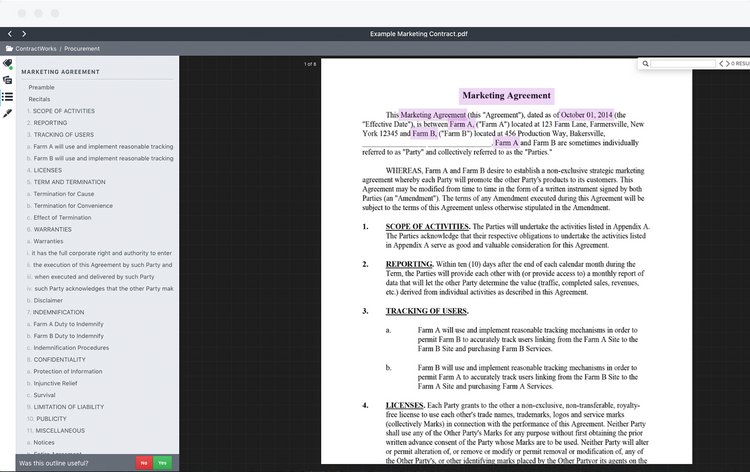
Features of Contract Management Software
- Contract Creation and Templates: Draft and edit contracts with all required fields and clauses. Use pre-approved languages and templates that let non-legal professionals easily cover their bases. Sign contracts electronically through e-signature capabilities.
- Contract Repository: Store contracts for indexing, analyzing, and linking relevant documents to critical contracts. Create a snapshot of the most important contract details.
- Optical Character Recognition (OCR) and Advanced Search: Convert scanned images of text and documents into editable text formats. Usually converts PDF files into DOC files. Search your repository for specific wordings through search tools that can pick up what your scanned documents are referencing.
- Alerts and Alert Rules: Get notified of renewals, pending obligations, provisions made to contracts, or adjustments to terms and conditions. Set up alerts based on any date field captured in the contract.
- Reporting and Dashboards: Sort through all your contract data and create custom reports via columns you can filter and sort. Discover insights on work patterns such as renewal times, when obligations are met, and contract cycle times.
- Approval Management: Create a contract approval process during the negotiation and review process. Handled through user selection and a routing order to improve approval workflows. Get updates when a contract moves along the workflow. Require electronic signatures at various points. Monitor redlining and collaboration via comments and chat.
- Workflow Management: Tracks real-time progress throughout a contract lifecycle, assigns tasks to specific employees, and clearly describes project requirements within the system
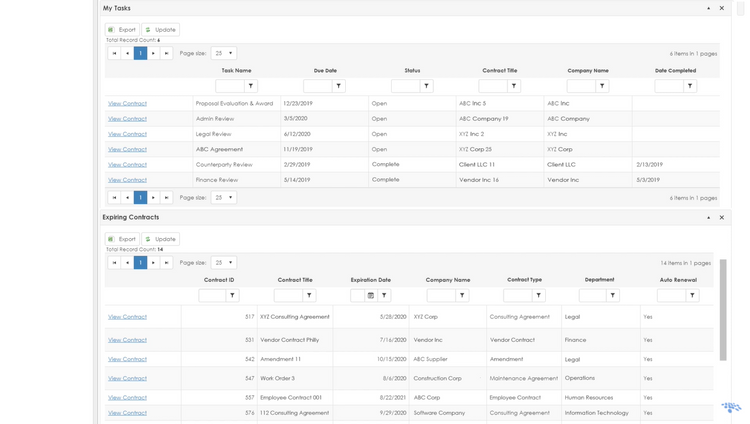
Benefits of Contract Management Software
The best contract management software will completely automate your contract process through automated workflows, expediting the contract review process via shortened approval times. The right software will also improve your preparation in the event of audits. Some of the top benefits include:
Reduce Risk and Ensure Contract Compliance
The most significant benefit a contract management system will provide your business is covering your bases surrounding contract terms, conditions, controls, and policies. Increasing contract compliance will encourage repeat business and standardize your processes regarding buying and selling or performing your work duties for a client.
For example, when bringing on a new supplier, you must take them through an onboarding process to verify their credentials and certifications. Doing so can help better identify which suppliers to use in various scenarios and who may pose the highest risk of interruptions to your business through regulatory violations, shipment delays, and more.
Putting a compliance framework in place will also allow for better accountability from putting out a request, creating a contract, and approving it. This is accomplished by securely storing the terms of the contract so they can not be altered or deleted at a later point. Suppose a business you are working with can perform as stated in the terms and conditions. In that case, this should demonstrate their willingness to be compliant and thus be someone you want to continue entering into contracts with.
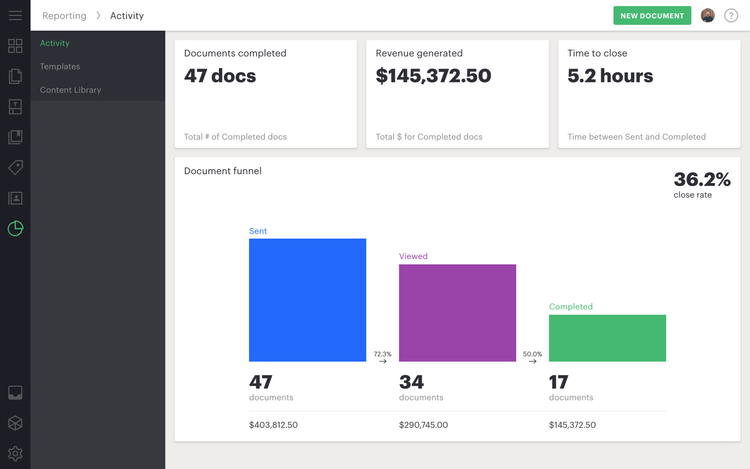
Improve Your Document Management
Contracts, at their most basic level, are documents; contract management software can be considered a specific type of document management software. These solutions digitally receive, maintain, and archive contracts, and allow for the storage, sharing, indexing, and versioning of various types and templates. If the two types of software are one and the same, how does contract management software improve your document management?
A contract management software with solid document management capabilities will manage storage in the event of disasters through backups on varying servers or different locations. This means you do not need to outsource the storage of your contracts or use manual methods such as file cabinets. A contract management solution can be an extension of document management software–letting you scan documents and import new contacts from info received from the contract via OCR technology. Version control will also let you know which employees have accessed and edited your documents.
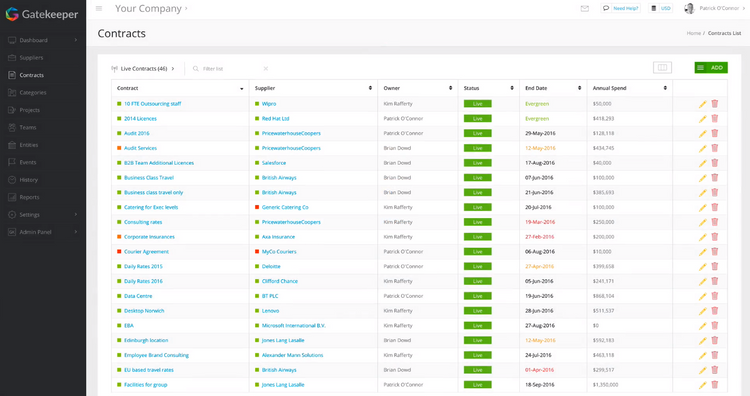
Lower Costs and Increase Accessibility
How does an additional software system that costs money help your organization lower operating costs in the long run? Like any software purchase, you need to focus on the return on investment (ROI) the software can offer you. When signing contracts, your business can face penalties for payment errors or failure to stay compliant. Contract management software will help your business discover opportunities to avoid shortcomings through contract administration.
This can be accomplished through improved automation in your contract lifecycle management process. By creating a workflow that your software can perform on its own, you’re freeing up resources (in the form of paid staff) to handle other tasks essential to your business–reducing your overall costs spent on contract administration.
Increasing automation will also avoid common errors in a manual contract review environment. With a centralized contract repository, finding misplaced contracts, utilizing smart search tools, or finding old negotiation details from former employee files is quicker than ever.
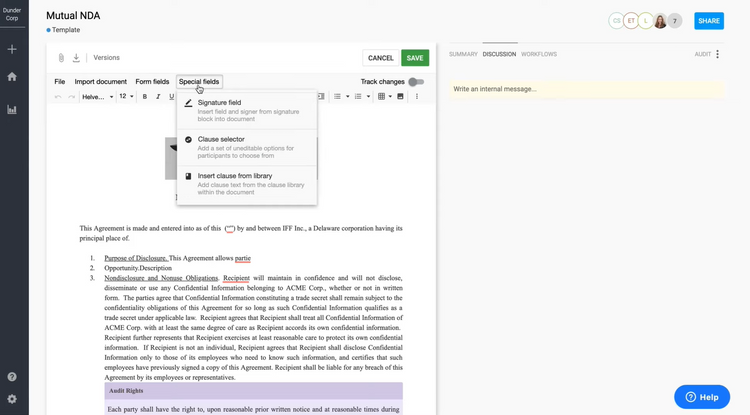
Types of Contract Management Software
There are a variety of contract management software options available for your type of business, including:
Small Business Contract Management Software
Small businesses and freelancers may want to cover their work offerings through signed client agreements. However, they may think a complete contract management software isn’t for them. This may be due to cost concerns, or the belief that they don’t have enough contracts to justify the software purchase. And they would be partially correct.
Many business management software options may have a minor contract management functionality built into it. When creating a sales order, you can create specific terms that you can email to a client and have them sign off on. Small businesses looking for a feature-rich system (such as those best used by large entities) may be better off looking into more refined solutions in their services. Some small business options will address specific contract management issues at a much more manageable price tag than complete contract management software.
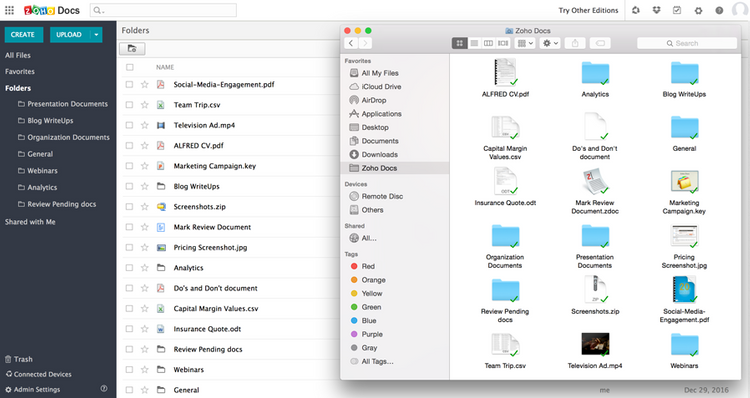
Enterprise Contract Management Software
Unlike the small business variety, enterprise contract management software offers a complete option that covers the entirety of an organization’s commitments into a single unified system. These options provide the benefit of maximizing your company’s financial performance, running routine risk audits to identify missed clauses and compliance with regulations, standardization across all contracts through templates and clause libraries, and real-time collaboration for a spread-out workforce.
An enterprise contract management system is typically used by medium to large-sized businesses with multiple divisions and/or stringent compliance standards. These businesses may also do business in multiple countries–making compliance with regulations more important than ever.
Contract Lifecycle Management Software
While some software developers may market themselves as “contract lifecycle management software,” you can rest assured you are receiving the same type of offerings as contract management software. Both options will allow you to control, coordinate, and streamline all stages of the contract lifecycle. This, in turn, will optimize your contract performance.
Adding “lifecycle” to the name is common in enterprise systems. These types of solutions like to consider themselves offering more than a baseline contract management software. CFOs and other top-level users can look for these options to optimize their procurement cycles and increase sales by accurately forecasting revenue and improving compliance.
Contract Management Software for Healthcare
Healthcare contract management software–or medical industry contract management software–is specifically designed to be used in hospitals and health offices. These industry-specific options handle all of the complex regulations the healthcare industry faces–such as HIPAA, HITECH, and the False Claims and Joint Commission).
Common agreement types covered include physician employment agreements, nondisclosure agreements, insurance and bond information, and managed care agreements. In addition, this specific tool will manage physician recruitment contracts, physician employment contracts, and medical directorship arrangements.
Pricing of Contract Management Software
The cost of contract management software starts at $59/user/month and can range as high as $775/month. The pricing model of contract management systems depends on the number of users requiring access, the number of contracts you’ll create and store in the software, and the type of package required.
A simple solution for drafting and creating contract templates will be on the lower scale, while a complete enterprise contract management solution will fall on the higher end. Some software may advertise as $XX/user/month but have a minimum user requirement–raising the effective monthly payment.
























